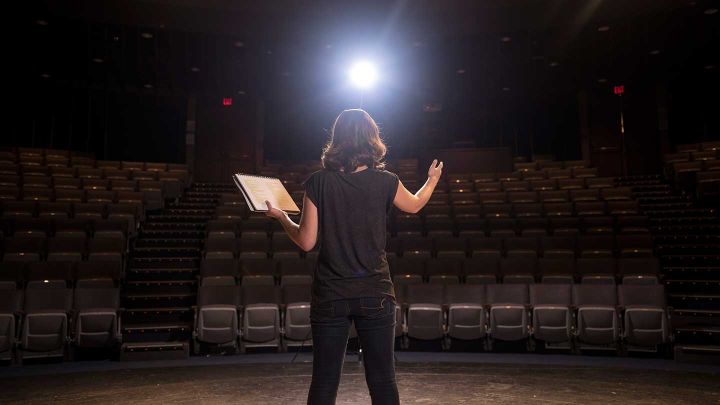Between controversy surrounding the ceremony, a host expected to address that very controversy, one of Hollywood’s most famous actors pursuing his first Oscar and the closest Best Picture race in years, Sunday’s Academy Awards (more commonly known as the Oscars) were preceded by much anticipation.
The night did not disappoint.
The 88th iteration of the Oscars featured some notable stylistic differences: first came the idea to unveil the awards “in the same order in which a movie is made.” Thus, the first two Academy Awards of the night were for Best Original Screenplay and Best Adapted Screenplay, major honors that are typically presented later in the night. Much attention was also paid to aesthetics: Cate Blanchett introduced the award for Best Costume Design by walking through on-stage examples of costuming, and attendees were visibly wowed by the all-surrounding, thunderous noise of motors that filled the auditorium before the presentation of the awards for Best Sound Editing.
As for the awards themselves, post-apocalyptic thriller “Mad Max: Fury Road” dominated in the early going, picking up six trophies during the night, all of them production awards, such as Best Production Design and Best Sound Editing.
Most years this kind of success would not be a surprise given how extraordinarily impressive the film was visually. However in a year that also saw “The Revenant,” sci-fi thriller “Ex Machina” and of course “Star Wars,” the “Mad Max” near-sweep was noteworthy, so much so that comedian Louis C.K., while presenting the award for Best Documentary Short, jokingly told the audience that the winner was “Mad Max.”
The major acting categories saw few surprises: many an eyebrow may have been raised when Mark Rylance (“Bridge Of Spies”) won Best Supporting Actor over Sylvester Stallone’s aged Rocky Balboa (“Creed”), but Alicia Vikander (Best Supporting Actress, “The Danish Girl”), Brie Larson (Best Actress, “Room”) and Leonardo DiCaprio (Best Actor, “The Revenant”) all gathered momentum on the awards circuit and entered the Oscars as favorites.
DiCaprio’s win, while universally expected, had the feel of a momentous occasion; the world-famous actor has famously struck out at the Academy Awards, being nominated for only five awards over 20 years and losing each time. On Sunday, his inevitable victory was met with a standing ovation. In an example of humility, DiCaprio used his speech to convey his graciousness, but also as a platform to call attention to the threat of climate change, his passion for the cause evident in his tone.
DiCaprio’s film, “The Revenant,” had a big night as well, winning Best Cinematography and Best Director. The latter went to Alejandro Gonzalez Iñárritu, who won last year’s Best Director Oscar for “Birdman,” making him the first director since the 1950s to win the award in consecutive years.
However, the investigative journalism drama “Spotlight” may have had the best Oscars performance despite only winning the first and last honors of the night. The Academy Awards began with the film winning Best Original Screenplay, an award that is so significant that it’s often referred to as a consolation prize for Best Picture. No consolation prize would be needed this year, though, as “Spotlight” surprisingly took home Best Picture as well, in one of the bigger upsets for the top prize in recent history. “Spotlight” had the best critical response from any Best Picture nominee, but major wins elsewhere on the awards circuit had the more commercially successful “Revenant” and “The Big Short” as favorites in betting odds and predictions.
All in all, the big winner on the night may not have been any actor or filmmaker, but rather the host, comedian Chris Rock. When the Oscar nominees were announced in January, there was an immediate backlash over the lack of any actors, actresses or directors of color represented in the major categories. This spurred the hashtag #OscarsSoWhite, which continued to be a relevant term preceding and even during the ceremony, and also led many prominent non-white actors and filmmakers to boycott the awards.
Therefore, many expected Chris Rock, whose brand of comedy has often been racially-based and biting, to address these issues head-on. Rock did not let fans down. Walking out on stage for the first time after an opening montage of moments from 2015’s films, he shook his head and said, “Man, I counted at least 15 black people on that montage!”
The crowd enthusiastically applauded and then laughed even harder when he followed up with the remark, “You realize if they nominated hosts, I wouldn’t even get this job. So y’all would be watching Neil Patrick Harris right now!” (Harris hosted the Oscars last year, and similar attempts by him to address the racial discrepancy often fell flat).
Nearly the entirety of the monologue followed suit, with Rock seemingly growing more and more comfortable in front of his mostly white audience, at one point explaining what “type” of racist Hollywood was. FiveThirtyEight’s Walt Hickey called it “a barnstormer of an opening monologue . . . the closest thing I’d compare it to is Stephen Colbert at the White House Correspondents’ Association dinner ripping apart George W. Bush right to his face.”
Even in later appearances in the show, where past hosts would likely have offered small jokes at the expense of some of the year’s movies or top actors, Rock continued to address the issue of diversity, often times through gags.
One gag saw actress Angela Bassett use the Oscars’ “Black History Minute” to praise white comedian Jack Black. Another reimagined some of the nominated films by placing black celebrities in them, such as Tracy Morgan in “The Danish Girl” or Whoopi Goldberg in “Joy.”
Rock’s performance didn’t resonate with everyone, though. Some critics found his repetition of the same theme simplistic, or his gag involving Fox News correspondent Stacey Dash awkward, or his joke involving small Asian children particularly offensive. But there’s no denying Chris Rock was in control Sunday night. With a sly grin on his face the whole night, he undoubtedly got the reaction he wanted from both the live and the television audience.






